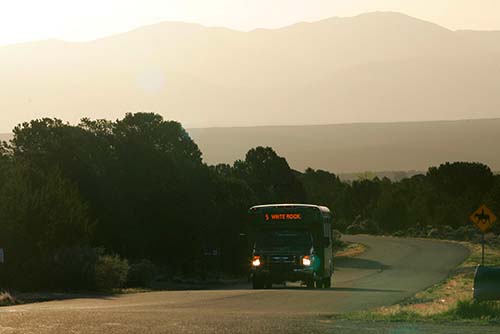
- Details
- By Tribal Business News Staff
- Economic Development
WASHINGTON — Twenty five American Indian and Alaska Native governments will receive more than $7.7 million combined for initiatives to bolster public transportation on tribal lands.
The projects span a range of service and equipment improvements for tribal communities spanning 11 states and vary in size from $25,000 to more than $1.8 million.
The funding comes via the U.S. Department of Transportation’s Federal Transit Administration, whose Tribal Transit Program funds capital projects, operating costs and planning activities for public transportation services on and around tribal lands. Federally recognized tribes and Alaska Native villages are eligible for the competitive grants.
“The Federal Transit Administration is committed to partnering with tribal residents to support their transportation needs,” FTA Deputy Administrator K. Jane Williams said in a statement. “We’re proud to invest in their transit systems which provide access to critical services, which is particularly important during the public health emergency.”
Recipients of the Tribal Transit Program funds were:
- Allakaket Village in Alaska — $167,850 to purchase a vehicle and launch transit operations for residents in the isolated village
- Asa’carsarmiut Tribe — $369,361 to begin a transit service for tribal members in Mountain Village, Alaska
- The Hydaburg Cooperative Association in Hydaburg, Alaska — $866,200 to make access improvements to ferry landing sites
- Native Village of Eyak, Alaska — $22,500 to develop a transit plan aimed at improving access and connecting residents to jobs, health care and economic opportunities
- Native Village of Ruby, Alaska — $64,495 to fund the purchase of a transit vehicle
- Native Village of Unalakleet, Alaska — $52,975 to expand transit operations
- Noorvik Native Community, Alaska — $1.8 million to fund construction of a storage facility to house its paratransit fleet
- Sitka Tribe of Alaska — $281,750 to replace an aging transit vehicle
- Village of Iliamna, Alaska — $166,499 to launch a transit service and buy a transit vehicle
- Yavapai-Apache Nation in Arizona — $445,000 to expand transit service in Yavapai County and statewide
- Fond du Lac Band of Lake Superior Chippewa in Minnesota — $131,400 to replace older vehicles to ensure continued weekday service within the reservation and to Duluth
- White Earth Band of Chippewa Indians in Minnesota — $414,896 for the purchase of new vehicles and to ensure continued service for tribal residents
- Chippewa Cree Tribe in Montana — $25,000 to develop a long-range transit master plan that addresses continued transit services for tribal members traveling to jobs and essential services on the Rocky Boy’s Indian Reservation
- Winnebago Tribe of Nebraska — $528,617 to expand the Winnebago Tribal Transit Maintenance Facility
- Mescalero Apache Tribe in New Mexico — $523,693 to purchase a mobile snow plow and to maintain transit services
- Nambé Pueblo in New Mexico — $67,500 for the purchase of a new, accessible vehicle
- Pueblo de San Ildefonso in New Mexico — $144,000 to build ADA-compliant bus stops, which will include shelters, benches and other amenities.
- Pueblo of Pojoaque in New Mexico — $67,500 to buy a paratransit vehicle
- Eastern Shawnee Tribe of Oklahoma — $139,181 for the Northeast Oklahoma Tribal Transit Consortium (NTTC) to purchase new passenger vehicles
- Muscogee (Creek) Nation in Oklahoma — $214,730 to buy a computer-aided scheduling dispatch system
- Confederated Tribes of Warm Springs in Oregon — $350,000 to replace aging transit vehicles with new vehicles
- Cheyenne River Sioux Tribe in South Dakota — $248,110 to work with River Cities Public Transit to purchase transit vehicles to replace aging vehicles and to upgrade its maintenance facility
- Sisseton-Wahpeton Oyate of the Lake Traverse Reservation in South Dakota — $328,761 for the continued operation of a transit service for tribal members in Northeastern South Dakota
- Cowlitz Indian Tribe of Washington — $35,000 to purchase a vehicle to ensure continued efficiency for its staff in maintaining the tribe's transit services in the mostly rural area of Southwest Washington
- Forest County Potawatomi Community in Wisconsin — $235,303 to restart transit service in Forest County that had been suspended because of COVID-19
The more than $7.7 million in competitive grants are in addition to $30 million in formula-based funding the Federal Transit Administration makes available to tribes on an annual basis.
The competitive Tribal Transit Program grants are a set-aside within the formula funding, according to the agency. Successful applicants to the program must commit to a 10-percent local funding match.
